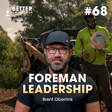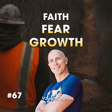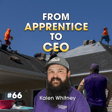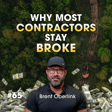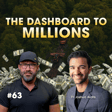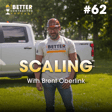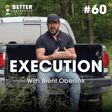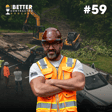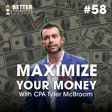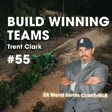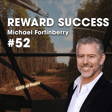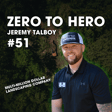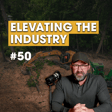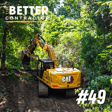Introduction and Guest Overview
00:00:00
Speaker
You want to boss up your life? All got to do is get in with me. I don't even pay to get in the club. They know I'm a walking tee. I'm presidential leaving the club. We ain't stopping at no lights. You want to be a boss?
00:00:11
Speaker
You got to pay the price. All right. Well, welcome back to another edition of The Better Contractor. Today, I am joined by our guest, Tony Watley with 365 Driven.
00:00:22
Speaker
Tony is a speaker, entrepreneur. He's done a bunch of stuff, and we're going to hear a little bit more about his story. And I'm also joined by my wife, Annie. I'd love to be both of you. Thank you for the invite. It's going to be fun to have this conversation.
00:00:35
Speaker
know, Annie, Brent, good to meet you also virtually as we do nowadays. I
Tony Watley's Background and Early Ventures
00:00:40
Speaker
know I kind of missed the little bit more in-person stuff, but this is a lot more convenient. I will say that. So Tony, tell me just a little bit about, and know a little bit about your background already. But tell tell the the listeners a little bit more about your background, kind of where you got to today and kind of what makes you an expert in your field.
00:00:59
Speaker
Yeah, I'd say that I started out in the pursuit of trying to make six figures. And that was ah as a child. ah My dad's a Marine vet, Vietnam vet, and ah mom worked in the public school systems as a cafeteria worker. So we didn't have much money growing up. And I learned to be very resourceful and go do things and take the actions to get the things that I wanted to enjoy. And early on, that was video games and and skateboards and BMX bikes. I grew up in the eighty s and 90s there. And so I think ah the first endeavor to be a entrepreneur started as a child. I was the one that was knocking doors and mowing yards and raking leaves and walking dogs and washing cars and doing whatever I could. And I really remember a lot of my friends would ride by and they see me mowing somebody else's yard and they'd be laughing at me and, know, say, Tony, that's not even your house. What are you doing? And, you know, I just didn't care what but people thought back then. It's just, and I wasn't going to get any you know money from my parents. So I figured out how to go do things at an early age. And,
00:01:58
Speaker
I think knocking on hundreds of doors and getting told no, probably 97 of those times kind of toughened me up and realized that not everybody just wants what you need and that's fine. And
Building and Monetizing Online Communities
00:02:08
Speaker
there's always people that will want what you need. And so think that was invaluable experience.
00:02:14
Speaker
I put myself through engineering school, working as a pipe fitter, a welder, and also waiting tables on the weekends. And that took me about seven years to graduate. I was just going to school at night and i was working full-time construction.
00:02:25
Speaker
And that kind of gave me the trades skills and learning how to do material takeoffs and measurements and learn how to stick rod weld initially, which led to MIG welding and TIG welding and, and doing different things like that. And so when I graduated with an engineering degree, had nearly 10 years of practical experience, which made me valuable in the oil and gas industry here in Houston.
00:02:46
Speaker
And I started to go down a path of project management and did that for over 20 years. i ended up in the offshore construction division and working for the majors like Chevron and contracting for some other companies later on. And the whole time I was working oil and gas and engineering, I decided that I liked cars. I'm a car guy and ah wanted to start start some businesses in the automotive performance arena. And so I created a number one general motors performance website called ls1tech.com.
00:03:15
Speaker
which grew into the top of its rank. And we had over 300,000 registered members, ah about 150 different advertisers. And we did live events, racing events and car shows around the country.
00:03:28
Speaker
And then I took that business model and I spun it off and I built performance trucks.net, which was another online community for people who like to drag race their pickup trucks. And instead of limiting ourselves to general motors, we want to dodge Ford and GM on that. And that community grew to over 250,000 members. And we were able to transfer a lot of our advertising accounts over because we already built those relationships and they trusted the product that we put out.
00:03:53
Speaker
And so i was able to almost
Authenticity in Personal Branding
00:03:54
Speaker
nearly double the revenue just by making a similar business issues in the same vertical. Nice. And i that correlates to your book, correct? Correct. Kind of that story.
00:04:05
Speaker
Yeah. What's the name of your book? Yeah. The book is Side Hustle Millionaire because all also I was building these things and yeah they were pretty large teams. We had mostly volunteers and people that were sponsored by different builds and projects that we're doing at the projects. And And we had about 75 people on staff.
00:04:21
Speaker
And so we found people that were very you know interested in the off road or racing or things like that. And they wanted to be a part of that community. And initially, we didn't have to pay them much because they got the perks. If they were a moderator or staff a member or ah contributing editor of you creating features and how to content.
00:04:41
Speaker
then they would get a lot of free car parts and you know tens of thousands of dollars of free car parts when it's your hobby is a great thing. And so we were able to monetize our audience through through the different you know revenue streams and and also have the live events.
00:04:57
Speaker
Yeah. How much did personal brand come into play when it came to building those two online businesses in the communities? Those two, I would say zero, 0%. I basically created the logos and put the websites out there. And I was always a good leader and facilitator in the background. But, know, honestly, Brent, i had no idea and no interest in putting myself out there on camera. i didn't want to be on stage. I didn't want to do that kind of stuff. And so I've always been more of a humble servant leader and building the community to make stronger bonds from the community members aspect. And it wasn't always about me and it was nothing about ego.
00:05:29
Speaker
And it also had a lot to do with insecurity and me not wanting to put myself out there. It's just not a comfortable thing to do. So one thing, Tony, i kind of admire since we've met is the way you've done your personal brand since you started 365 Driven. And the reason I say that is there's a lot of people who I've followed over the years, I don't follow now, and it's annoying to me how they run their personal brand.
00:05:50
Speaker
It's very flashy, or they may not have any any actual experience doing what they're coaching or doing what they're what they say they do, or they have a podcast to do whatever, but they're not actually an expert in that field. It doesn't mean they're not a good speaker.
00:06:02
Speaker
They may be an awesome speaker. But one thing I've admired about yours is it comes across more authentic, more genuine, and more raw. I want to see if you could elaborate a little bit on what you believe is kind of the importance of personal brand and kind of how you have have grown yours.
00:06:15
Speaker
You know, what you and i have a shared sentiment on a lot of the, i call them fake gurus, and I spell it even funny just to get people's attention. And you see a lot of my comment pointing out that kind of stuff. And, you know, not to be hypocritical, because I think that,
00:06:29
Speaker
I didn't become successful in the era of social media. And so you think about this, I sold my company for millions before Facebook and Instagram even existed couple of years before they even came out. And there was even a time in my life, I would say in my early thirties when I was making plenty of money and I had all these nice things and I still do.
00:06:48
Speaker
And I was more willing to show off the stuff. And, you know, though I remember, I remember, putting up a big ladder and and climbing up to the top of it with a wide angle lens and taking a picture of all 10 cars in the driveway. And it was, you know, some, some time around, I guess it would have been like 2008, 2009. Yeah, i was definitely showing off. you hiding behind this scene Yeah. Car. I was a car, car fanatic and, you know, people always knew what the projects I was building. I've built over 40 project cars, but I remember before, you know, snapping that photo that I felt kind of like a douche doing it, but,
00:07:22
Speaker
I just did it anyways. And, and so I don't want to be a huge hypocrite. I just understand that not everybody has the wisdom and experience and you know, they're, they're coming along and they're just happened to be at a different phase of life where they're using social media. And I was using forums and hopefully they do grow out of that. And that usually happens around 40 for men, but you and I both know there's a lot of men that are 40 and older that don't have their shit together and they're still acting like little junior high kids.
Business Challenges and Strategies
00:07:50
Speaker
know, I just wanted to preface that. So, yeah the The building of the personal brand is, became more authentic as I gained more wisdom and more age. And I just got tired of fake people and fake stuff. And now I've dealt with it my whole life, especially when you're in a leader of a large community with a lot of people that have plenty of money and everybody's, you know, we say big dicking and and showing off and trying to to get ahead of each other. And it's just,
00:08:14
Speaker
It's unnecessary. And you and I both know there's far more wealthy people that would never, you would never even suspect that they're wealthy. So it's not about just the flash and the flex. And, you know, i actually toned that down quite a bit, especially after COVID. And, you know, I still, people still see glimpses of my lifestyle and my cars and things like that, but I'm not out there making every single piece of content about something that I own.
00:08:37
Speaker
I think that your previous ones where you had the trusted product that you had, you know they would purchase the product, get it, use it. They knew that it didn't fall apart. It didn't break.
00:08:49
Speaker
And so it gave validity to the product. um But whenever it's you that you're selling, they get those glimpses of you. And they really have to connect with that immediate feeling of whether they feel like you're being genuine or not. They don't get to take the product home and make sure it doesn't break.
00:09:04
Speaker
Absolutely. I think that you need to have demonstrated results before you decide you want to go coach people or teach people how to do that. And unfortunately, most people get that wrong. I even have people I know that are great people and they see what I'm doing and they think of it as easy money. They're like, oh, you know, i can go be a coach too and I can make millions of dollars and Guys, it's not an easy business model. And the first thing people are going to do if they're wise is to go do background checks and figure out what you've
The Phases of Entrepreneurship and Exit Strategies
00:09:29
Speaker
achieved. And if you actually know what you're talking about and you can't fake that stuff. And so it's very easy to copy the content and the lessons that we have as experts, but it's very hard to prove that you've you been successful at that without the result.
00:09:44
Speaker
And, you know, you think about this, a lot of people are out there creating how to type content, how to do this, how to scale a business, how to exit a business, how. But they never say how I did this or how I did this or how I did this. And that's the distinction between someone that's been an expert, that's been there, done that versus someone who's just creating and regurgitating content that they've consumed from other people.
00:10:05
Speaker
And a large part of that, of how, how I did it is the failures that you had along the way, because that's really where lessons are learned. Absolutely. and I think when you stick with the how I did it type content, people can't dispute it because that's your experience.
00:10:20
Speaker
Yes, there are many ways to get to a different goal. But the way you've gotten there may be unique and it's the only way you knew how. So if you teach that and if you make content around how I did it or here's how the results are stacking up, good or bad, it builds the trust because people can't really get on the, know, the yeah throwing stones and and trying to shoot holes in your ideas because you've actually proven things.
00:10:44
Speaker
Yeah. And one thing I like about that is You should also be talking about your failures. And a lot of people do not do that online. It seems like they'll talk about, like you said, here's how to, and then maybe they should tell their story as well. I agree with that. But then lot of them don't ever tell, Hey, this is where I struggled. Hey, in 2012 or whatever, you know, this happened, this is how I got through that, you know, that tough trial.
00:11:06
Speaker
You know, there's a lot of people I feel like struggling now who, you know, post COVID or post all the bailouts and everything. And the economy just seems tight in a lot of industries. You know i was talking to a contractor two nights ago. That's one thing he was talking about was how, you know, it feels like his sales pipeline has, is starting to dry up a little bit.
00:11:25
Speaker
So we were kind of brainstorming just back and forth on ways to maybe, you know, help him out. But one thing I wanted to ask, and I like asking business owners this, and you've had a few different types of businesses, but what is something that was like, if you look back on your 20 years or whatever,
00:11:40
Speaker
That's like, man, that was a difficult time. And this is how I got through it. Cause a lot of our listeners, they may be in that spot right now. And they may be saying, you know what? I want to be where Tony's been. I want to be where Brent's at or whatever it is, but this is where I'm at right now. And it sucks.
00:11:55
Speaker
Well, what's an example or what would you say to that person? I would say that there's two examples that pop up in the mind that are very common. So I'll share those two. First one is working with partners or thinking that you need a partner to start a business.
00:12:10
Speaker
And the other one I would say is thinking that you need to have money to make money. That's another fallacy that needs to be dispelled. There's too many people out there that never really pursue their dreams and entrepreneurship because they think that they need capital to do this. And they're not thinking about it clearly. They're just using as an excuse to be real.
00:12:29
Speaker
You may not be able to start your dream business. Very few people are fortunate to be able to start their dream business, especially the first business. And the way I think about this is maybe my dream business is to own a Ferrari dealership with a road course racetrack right next door and in the mountains with a lake view. Like, yeah, that sounds great, but I don't have billions of dollars to do that.
00:12:50
Speaker
So I have to be more realistic and go, hey, what could I start now that may be able to monetize or sell or be able to cash flow to pay for that next business, which still may not be your dream business?
00:13:02
Speaker
But no top entrepreneurs start with their first business and hit home runs. And so you got to think of businesses like staircase or, or a career advancement. So what can I start now? Monetize that, sell it or whatever, use the money towards the next business and so on. And that's how traditional entrepreneurship tends to work, right?
00:13:20
Speaker
And so I think too many people use that as ah an excuse to get discouraged, not to start. And going back to the business partner things, I think that a lot of times we have good intentions with starting with partners.
00:13:31
Speaker
I think that stems a lot about insecurities. Like you don't want to do it alone. You want to hold hands when you jump off the cliff. And that sounds like an amazing story. And we've all seen the movies of these amazing partnerships and people are like, oh, I want that too.
00:13:44
Speaker
let's Let's go to top of the mountain and bring our friends with us. Like that all sounds great. But what happens is most people end up partnering with people that have the exact same skill sets or the same resources as they do.
00:13:57
Speaker
And then they butt heads because they both step on each other's toes when they're growing something. Or they haven't really had the hard questions like it's a relationship, it's a marriage, you tear a marriage, you understand long-term goals. They haven't had that conversation before they started.
00:14:10
Speaker
And what you find is that some people will be okay making $100,000 a year when a partner might might want to make a million dollars a year. And if you're not having those hardened conversations up front, what's going to happen is when you both hit a hundred thousand dollars a year, one of you is going to get kind of complacent and content and start doing things that are not really growing the company. And you're going to get frustrated because you feel like you're being held back. And I've seen this time and time again, especially with business coaching and consulting partners, especially if they're relatives, you don't always need a partner. And you know what, a loan is actually better
Preparing a Business for Sale
00:14:41
Speaker
to have than a partner if it's a capital reason.
00:14:43
Speaker
because banks aren't making business decisions for you. They're kind of a silent partner for the money. And you don't not don't ever use money as the reason to to partner with somebody unless they're being a silent partner, or just being an investor.
00:14:56
Speaker
Yeah, I would definitely agree with that. Luckily, we never did have partners, but that was one of the fears i always did have if we did bring one on was like what you said about goals. So like if my goals are way bigger and the other person, maybe they're older and they provide a capital,
00:15:10
Speaker
Maybe they don't necessarily want a business quite that big. You know, it would definitely stifle or be annoying for that person. Well, and where he was talking earlier, the first um online business that you started um was just um what brand was that?
00:15:27
Speaker
You talking about LS1 Tech? Yeah. Yeah. Yeah. Yeah. And then the, uh, the next one, you didn't limit yourself to just one brand. you That's right. And I think that the limiting limiting is what most people do. They limit themselves with their vision or the scope of work or the, they limit themselves with the people that they bring in as well. I would say when you, when you start, it's good to be focused to get traction because if you come in too broad, nobody really knows what you serve.
00:15:54
Speaker
And so I think it was important that we did focus on General Motors and especially, the you know, the Corvettes, Camaros, Firebirds, those models, because one, we were active members in those types of communities already. So we had the product, we understood the vehicles.
00:16:07
Speaker
We were the ones creating the how-to articles for different websites. And, and that allowed you to find your voice in your audience. and And so once we had the audience established and to give you guys an idea of what that looks like visually,
00:16:21
Speaker
We had over a hundred thousand unique visitors per day to that website. So imagine if you own a, storefront on main street of America, what it looks like to have a hundred thousand unique visitors walking in and out of your door every single day. And that's the size of this thing that it grew.
00:16:36
Speaker
And so you have to realize like get traction, make some revenue, make some profit, being very focused on things. And then once you can monetize that, then you can go wider in your product or service offerings.
00:16:47
Speaker
And then you already have your established reputation and your history and a lot of repeat customers and referrals at that time. Yeah, no, I like that. um And that's, yeah, 100,000 unique visitors is awesome, by the way.
00:17:00
Speaker
That's awesome. One thing I did have a question on too, 365 driven. So i would say that is a mindset, correct? If I had to kind of simplify I'd say it's a mindset and a lifestyle.
00:17:10
Speaker
I mean, ah I'm a community guy. I'm a community builder. And I said, hey, I want to serve a community of entrepreneurs. And that's why I created it. So it's very similar to the way I built automotive communities. I'm just looking for people who are enthusiastic about business ownership.
00:17:23
Speaker
Okay. Now, so in 365 Driven, you provide coaching services, correct? Correct. I've got group coaching. I've got one-on-one coaching, primarily how to scale and exit companies. And then I would do the live events and things like that that are more like retreats. We we took four or five days and we do these exotic vacations around the the world and bring in a couple of speakers and everybody hangs out together. And usually those groups are 30, 40 people at the max. Yeah.
00:17:48
Speaker
Okay. Okay. Do you help people to like, I know you're involved a lot at the very end where they're exiting their business and you're helping facilitate that. Do you also help them plan for that? Like, let's say they're five years out from making their business for sale.
00:18:04
Speaker
What are some key things that they people should start to look for? Cause there may be contractors listening to this now that are like, you know what? I'm 55, 60, 65 years old. My kids want nothing to do with this business at all.
00:18:17
Speaker
What should I be looking
Adapting to Market Changes
00:18:18
Speaker
at in order to be able to sell this in, let's say, three to five years? You know, what I found was going through the acquisition process is when I learned a lot about that. And honestly, I would say I left about a million dollars on the table, even on my first exit.
00:18:32
Speaker
And although we did really well, I think I left a million dollars on the table, understanding valuation and what things I could have enhanced before we took it to market. But what I started to realize is that There's three distinct phases of entrepreneurship.
00:18:47
Speaker
And as business owners, we try to focus on trying to be great at all of them. But the reality is each of us gravitates towards probably one or two at the most of those. And so the three phases will be the startup phase when it's you know, 15 hour days and you're just grinding it and you're, you're having to do everything yourself and you're, you're trying to pull all the levers, do all the service, create all the products.
00:19:08
Speaker
And that's where I say most of the business owners tend to be because just data, like most businesses go out of business within, you know, two years. And so the next phase is when you kind of start to get the cashflow you're starting to make some profit, you start to implement processes and systems and you start scaling. So you got the scaling phase.
00:19:24
Speaker
And the third phase would be the exit or M&A type phase. And what I find is that unfortunately, you know, Bureau of Labor Statistics shows us that only about 20% of companies actually get sold.
00:19:36
Speaker
And when I saw those kind of statistics, i was like, that's kind of shocking. It's like only 20% of businesses get sold. was like, so clearly maybe that means 80% are not for sale. That's that's the logical thing that pops in your mind. Yeah.
00:19:48
Speaker
But then you go do the research and realize like, no, most businesses actually are for sale, no matter how big they are, because they're usually a buyer that can buy even the biggest businesses. But the problem is, is 80% of businesses aren't worth anything to a potential buyer.
00:20:02
Speaker
And then you start to question, well, how is there 100% of these businesses out there and 80% of them aren't worth anything? Like, that doesn't make sense. but They may even make a profit. You may get owners that are making, you know, six figures, maybe even seven figures profit. They're having a great lifestyle off their business.
00:20:17
Speaker
And they think the company's worth something. And so they decide that, hey, I want to go retire, like you mentioned, or you said, I want to go do something else, pursue a different dream. And then they take their business to a broker and a broker does the assessment and creates the valuations. And it comes back like your company is not worth anything. It may be the land that it's sitting on or maybe some wholesale you used goods for your all your equipment.
00:20:40
Speaker
And that's kind of heartbreaking, especially if you've been making a good living from that. And so i found that I actually became more fascinated on the exit side of things because it is an emotional journey. Like when you're selling real estate or selling your favorite car.
00:20:52
Speaker
get attached to things as a business owner. So you think that that's worth more than it really is to the market. But if people don't buy it, then it's really not worth anything. And so, yes, there are things that need to be done to make sure that your your enterprise value is increased. And,
Financial Strategies for Business Valuation
00:21:07
Speaker
you know, unfortunately, most people don't find out until it's too late because they're trying to sell a business when their health issues or partner dies or a divorce or something that creates a reaction to sell a company.
00:21:17
Speaker
That's a terrible thing to do. And I think that you need at least three years or so to plan to make your business more valuable before you decide to exit. Yeah. Do you think that also it is like with overtime, the shift in job markets and then failure to change with that and they get tunnel vision because this they've got their processes in place, which processes are so important and you're supposed to.
00:21:38
Speaker
maintain your processes and then they fail to pivot. And then by the time they realize that they didn't keep up with the market, then it's too late to do something about it. Absolutely. I think that we should always not necessarily embrace technology, but understand technology.
00:21:54
Speaker
Anytime there's a new development and anything that can help our our business, we should be aware of that. At least I think the people that resist technology or resist even learning about, like we can talk about AI and things like that nowadays,
00:22:07
Speaker
If you're not curious about what other people are starting to use, then that's gonna probably bite you in the ass because then you'll be behind the curve and then everybody else and your competitors will be way ahead. And so I've always been the type of person, i wouldn't say necessarily a first adopter of things, but I'm pretty close to a first adopter where I see enough buzz about it, I'll go do some research on it and play with it or maybe get a license to that software or whatever and explore what possibilities are and if they can be implemented for myself or my clients.
00:22:36
Speaker
And I think that anyone that's in the space should be welcome to understanding the technology, not necessarily have to use it, but could it help? And you may discover that what your customers or your ah competitors were actually are using against you.
00:22:50
Speaker
Yeah, I think it's important. You mentioned it earlier, like a lot of people don't start thinking about it until they're actually getting ready to make that exit. And so, you know, whether selling it or whatever, or being acquired. One thing I think is important for a lot of business owners to do is to know how their business might possibly be evaluated in that moment. So like, you know, in our industry, you know, one of the heavy things is your earnings before income taxes and depreciation.
00:23:15
Speaker
Then that's usually times some kind of factor. So if you know, hey, I'm getting ready to sell this in three to five years, I can then go through and then say, hey, I need to increase this number over the next three years on my financials.
00:23:27
Speaker
so that when they come time to go ahead evaluate that, yeah I have a history of that being already good. and Same thing with your debt and asset ratios and some other ratios like that. So I do like that. I think we had a podcast guest not too long ago actually reference running your business as if it's always for sale. yeah You know, that way you're always looking at those key financial things.
00:23:48
Speaker
it isn't It is a different way to run a business. I would say that for most small business owners, You do what we all do. We try to minimize tax exposure. And so we reinvest the profits back into the company to either, know, improve the equipment or hire more personnel or do things that are, you know, scaling related.
00:24:07
Speaker
The thing about doing that and trying to minimize your tax exposure is also reduces your EBITDA. It reduces your net profit, which makes your company look less valuable on paper. Cause like you said, it's a factor of profit.
00:24:19
Speaker
Small businesses. Yeah. EBITDA is a big word, but Net profit's kind of the easiest way for most people to visualize that thing. And it's really understanding that, hey, what are the things I need to do to manage my business to increase profit? And going to have to pay more tax if you want more valuable company. Now, we can we can attribute one-time costs and things like that back to seller's discretionary earnings, which is another way to calculate valuation.
00:24:43
Speaker
we just call that SDE. But unless you can prove it, and especially if you guys are out there, small business owners, and you're paying, getting paid with cash, you're trying to do things to not get things on the books, you're really just kneecapping yourself on the valuation. Because unless you have anything in written transactions that you can prove the money that you've made or the money that you've spent,
00:25:02
Speaker
None of that matters because if it's not in writing, it kind of doesn't exist. And so it's important to understand when you're building a valuable company that I got to document everything, all the transactions need to be there. I need to be able to justify everything.
00:25:15
Speaker
And I just really want to maximize
The Power of Personal Branding
00:25:17
Speaker
profit. and And really, the only two real ways of maximizing profit is by cutting costs or increasing prices. Perfect. Perfect.
00:25:26
Speaker
um So one thing I want to go back to is personal brand just a little bit. I want to pick your brain a little bit on where you think that's going. So like, i feel like we're in a pretty saturated market at the moment.
00:25:38
Speaker
And I feel like more and more businesses, not so much in the contracting world, which is what most of our audience is. But what would you say to someone there who has not created a personal brand? They maybe are not even all that digital yet.
00:25:50
Speaker
How important is that in your opinion that they get out there and get personally known and get their business out there more? And where do you think that might be going? I like to ah share a story from the stage on this exact question.
00:26:02
Speaker
The, I'll use it. I'll use a mechanic example for my car guys. If you were a mechanic and you were busting your ass 50 hours a week, working on cars and having to spend tens of thousands of dollars on all the different tools to do all these different things.
00:26:18
Speaker
And you go buy those giant snap-on toolboxes that most of those guys mortgage for six figures for crazy toolboxes because that goes back to ego as well. And somebody walks in and say, hey, man, I got this one tool that I'll sell you that can do do everything. It can just solve everything for you.
00:26:35
Speaker
you know, and and it's free. Like, well, who would not take that free tool that could solve a lot of the problems for you? And then they go open the toolbox and it's one drawer and and and it's the cell phone that's in their pocket. So if you got this tool, this magical tool that has the world at its fingertips and all the information you ever want to know and can generate money for you if you use it properly and it's free because you already own it.
00:26:57
Speaker
Like, why wouldn't, why wouldn't you use that? It just seems kind a counterintuitive to success. And so like many, we consume a lot of content. We watch what other people are doing and you go, I could do that. I could do that. You tell yourself the lies, but you're not actually pushing the record button or actually creating any content.
00:27:14
Speaker
And you wondered why year after year, so-and-so is business is growing and growing and yours is kind of staying stagnant or declining. And you have to think about this as now it's like, we're talking about marketing here.
00:27:25
Speaker
Personal branding is marketing as a business owner and In the world where everything is moving to digital and virtual reality and AI and all these things that are kind of really low value because they're not authentic, there's a shift for consumers to want to interface with real humans. Imagine that because everything's become Zoom and online and things like that. It's like interactions with humans and getting to know people, getting to know characters, it becomes more valuable. So people do business with who when we've heard. It's like people that are known, liked and trust.
00:27:58
Speaker
And you can't do that if you're not putting yourself out there and people don't know who you are and they're not seeing a ah name or a face that goes with the business logo. And so if you think that putting yourself out there would potentially increase the profitability of your company, then why aren't you doing it?
00:28:16
Speaker
And the answers are generally because we, We fear being judged. don't want to put ourselves out there. We have insecurities or maybe i don't look good enough. I don't speak good enough or all those excuses. Like everything can be learned. Like you and i are having these conversations.
00:28:32
Speaker
We'll stand on stages. We'll be on other interviews. People hear us speak and they go, oh, they're so talented. But you and I both know that communication is not a talent, it's a skill.
00:28:42
Speaker
And skills are learned. And you have to be willing to invest in those skills. And I have ah invested tens of thousands of dollars working with speaker coaches and mindset coaches and different people that could teach me to be become a better communicator. I've spent money to learn copywriting for my online written form of communication.
00:29:00
Speaker
And so communication skills is very valuable. And most people just assume that it's talent, but it's not. It's not something we're born with. It's not something we're just instantly great at. And if anyone thinks that they're great at it without any training, then that's probably just being cocky. You're probably not as good as you think you are.
00:29:16
Speaker
And so yeah I think personal branding is, it's only going to become more prevalent and it's becoming more and more important. And i don't, I don't think, I don't, I disagree that it's saturated. I think that you and i believe it may be saturated perspectives because of the people we follow, the people that we interact with, because they are doing that.
00:29:36
Speaker
But the general population has zero clue about this stuff who are your customers, especially if you're talking about trades and services type businesses, Those are just people out there that are just kind of doing their day to day, not really being involved in the social media aspect.
00:29:51
Speaker
They may see your content and decide that they want to work with you when they need your services, or your product.
Documenting Journey as Content Creation
00:29:56
Speaker
And that's what we want. So, yeah, we have a skewed version of saturated. And especially if you're if you follow a lot of people in your industry.
00:30:03
Speaker
But the reality is they're probably a very, very small, probably less than one percent of the entire industry is the people you're observing. That is very true. And I look back, this is not something I necessarily enjoy is doing like the podcast and we're still pretty new to it, to be honest. It's still fairly new to the personal brand.
00:30:19
Speaker
And if it wasn't for like our day that we're both have been a part of that, I probably still would not be, you know, i remember one of the events, I forget who it was, was speaking and basically just made the challenge of like, do it.
00:30:32
Speaker
And you know, I'm someone that's, I think it was Andy that said, you don't tell your story, someone else will. Yeah. and And it's kind of one of those things for me. I'm naturally a little bit more introverted. yeahp I'm naturally a little bit more reserved.
00:30:43
Speaker
I don't mind having a one-on-one with you. It needs to be deep and it needs to be meaningful, but I don't necessarily want to shoot the shit with someone and just to put stuff out there all the time. But to go to your point, most people do want to know who they are buying from. That's right.
00:30:59
Speaker
I'm that way. And if I don't put myself out there at all and someone goes to find and purchase the service I'm providing, They're not going to know me. and that That immediately removes some of my chance of success with that person because maybe we would have resonated online.
00:31:15
Speaker
Maybe if we're in a bid scenario, maybe it would have been a bid that was like tight and they look both of us up and they you know what? We kind of like that Tony guy. We kind of like that Brent guy. I'm going to go with them because the bids are similar.
00:31:28
Speaker
So it's hugely powerful guys that that are listening to to give it a whirl. You may think, you know what? I'm not the expert. To someone, you're probably the expert though. Yeah. You know, if you can be interesting or, you know, whatever it is, document your story. There's so many people I know that just like following people's story. That's right. So maybe you're not even successful yet, but you're going to get there. And people do like following that journey. There's a person I know that is a contractor and he's still pretty new to it.
00:31:56
Speaker
And he's just putting everything out there. And as someone who is his age, you know, when, when we started the business, It's cool to watch him because i know he will succeed. And I love watching the process. I think he nailed it right there. That, that is actually one of my tactics when it comes to creating content. Cause a lot of people have this, it's an excuse. Let's be real.
00:32:15
Speaker
I don't know what to create. I don't know what to post. That's what they say. Everybody uses that because it's an easy cop out document that journey. mean, we hear Gary Vee talking about that. don't He says document, you know, don't create, like just document things. And so if you look back, you know, since you've known me since 2018, people got to see me document writing the book.
00:32:38
Speaker
chapter by chapter, I'd share excerpts from the book and solicit feedback. And had these different cover designs, the artwork that came through and say, Hey guys, here's, here's a dozen different designs that came back in from the artists. Like which one's your favorite? And so I, was documenting the process of writing a book. And so when it launched in early 2018, sold thousand copies in one week and people were excited about it because they had contributed ideas to it and participated in it. I treat it like a project.
00:33:05
Speaker
that became the podcast, which launched later in 2018. Right. And what
Learning from Failures and Continuous Improvement
00:33:11
Speaker
are the other things I think about public speaking was another journey I was on. was like, I, like I said, like I'm an introvert like you and i was not comfortable on stage and I was always good at,
00:33:20
Speaker
having the, the rah-rah type, know, project kickoff meetings in front of my audience sort of of employees and staff members, like that was easy. And I thought, know, surely I'm good at public speaking because I have the occasional courage to stand up in front of people and say things. And I don't need any lessons like the ego talking right before I had wisdom.
00:33:38
Speaker
And, you start to realize like, okay, I'm not that good. I just have a captive audience. When I'm signing their paychecks, they can't really leave or pull out their phones and start to do other things. And so you realize that I'm going document this journey. And so I joined Toastmasters and I documented that journey and I showed excerpts of things I was working on and here's a speech and here's a competition I entered, which was very uncomfortable and I did very well.
00:34:03
Speaker
And then I started to document things. you know, building a separate business, my wife's real estate company. And I started to document, okay, i'm going to go back into powerlifting, you know, and I've been doing that for about 12 years. And I said, you know, I said, all my friends are just posting pictures of doing bicep curls and flexing in the mirror. It's like, I'm going to go on this mission to become better at deadlifts and squats because most men skip leg days. They just want big arms and they look funny because their legs are smaller than their arms.
00:34:29
Speaker
And so I decided, you know what? and Very few people are showing deadlifts. was I'm going to start showing that I work out all the other parts of the body, but this is what I'm going to show. And I remember the first time I could lift it 315 pounds and it was a struggle.
00:34:45
Speaker
And that lasted for a year and I was doing four Oh five and now I'm dead lifting over 500 pounds and I'm 52 years old. And so I took people on that journey, like you said, and and I would actually show the sets that I failed and it's like, didn't get it this time, but people be like, Hey, you'll get it next time. Right. And so i do this for a reason and it's a pattern. And even with the comedy school, it's like, you know what how do I enhance becoming a better speaker?
00:35:09
Speaker
How do i enhance becoming a better podcast host? I'll go to do improv comedy school, which to me is way more challenging than public speaking lessons because you're not building your character. You're assigned a different character every time you step on the stage and you have to act that part out.
00:35:23
Speaker
So you don't get to think about things or plan things. And I did that. That was a one year of improv school and in Houston. And so I took people on that journey. And so. The whole reason you do this is to build trust and also to show results and be willing to be humble and show that you suck at things and you're new at something, but you're going to keep people, you know, you're they're going to get to see the updates along the way and they're going to start to feel inspired.
00:35:49
Speaker
And when they do start to get results, they're going to start to believe, man, if he could do it, I can do it. And that's what I want. Cause if I can do it, you can do it. It just takes some work, dedication, determination, And, you know, finally, I guess the the last part of that is you see me skateboarding in bowls now at 50, I decided, you know what, I'm going to learn how skateboard.
00:36:06
Speaker
And i fell down a lot and I wore all the pads and the helmet and the gears, like I'm going to be as safe as I can. And I fell down hundreds and hundreds and hundreds of times. And I went from not even be able to make it down the driveway to skating bowls and 12 foot verticals and all kinds of stuff in less than a year and a half.
00:36:22
Speaker
And so take people on that journey. And that's, that's the content that you can create. i Multiple times while you were speaking, the word that just kept standing out to me is do.
00:36:35
Speaker
like do it. something and then And then you would just do it. And then you just do That's right. And the reality is the
Overcoming Fear and Taking Action
00:36:41
Speaker
when we were talking earlier that the market was saturated. It is saturated. It is saturated with a lot of people who who are not doing.
00:36:49
Speaker
yeah i think there is a very small percentage of people who are doers. And unfortunately, I think that a lot of the people scrolling, don't fall into that category. and And you can't motivate somebody who's not a doer to get up and do.
00:37:04
Speaker
It has to be, that's inside you. Like you're doing comedy, you're doing skateboarding, you're doing, you're doing so many things. You're actually doing it, not talking about it, not reading about it.
00:37:15
Speaker
And I think that that is lend itself to a small part of why you're so successful is, is that you're you're doing. i agree with that, Annie. Here's the thing. I think that let's Let's reframe that perspective because what I see is that people, we're always in it like, okay, let's group my thoughts here.
00:37:36
Speaker
We're always like trying to build status as we as we, you know, you're there trying to build financials, you're trying to build status or social credibility. Like it's always like building kind of like the brick wall right behind you.
00:37:48
Speaker
And the problem is is, that people will kind of go down this path and they're building status maybe within an industry or within a skill set or their career. And they keep adding little brick by brick. And it's hard, guys. I get it. You're adding these bricks, small little increment movements at a time.
00:38:05
Speaker
But then when you introduce change or something that's different, they're not willing to gamble the higher status that they've built in some area of their lives to go be the beginner at something new.
00:38:16
Speaker
Like that is the hardest thing that most people struggle with is like, man, I'm i'm really good at you i was swinging a hammer and like in and building roofs. And I'm really good at that. But man, I suck at BMX motocross. Like I suck at that.
00:38:30
Speaker
And the problem is that most people are unwilling to go suck at something or be a beginner at something and actually document that and put it out there. They're, they're so worried about what other people are going to say and the judgment. And it's just, yeah, you suck and you should be humbled and you should never assume that it's a lateral move. Like if you're good at this, doesn't mean you're going to be good at that.
00:38:49
Speaker
You should be willing to go suck at something that new and be humble about that. Cause that was far more interesting. And you know, that's why we like to see the zero to hero journey. That story is what every movie line built on.
00:39:00
Speaker
Why not emulate those things? Why not say, Hey man, I'm super successful at this, but I want to go weight loss journey and do deadlifts and and push on this. Like why that's not even in my space. I don't teach fitness. Right.
00:39:12
Speaker
And so get out of that mindset you have to be good at everything. Cause I think most people, here's what, here's what most people do. They made, you know, you and I know a lot of people like in Brazilian jujitsu, right?
00:39:23
Speaker
A lot of them will go get into a new hobby, but they won't say anything about it. They'll keep it quiet. Or maybe you go, hey, i want to go on a weight loss journey. And you keep quiet about it. And you're not even going to share it until you think you're proficient enough to actually show some results.
00:39:40
Speaker
And when people go, Hey, you look like you lost a lot of weight. and you're like, Oh yeah, I started this thing a year ago and blah, blah, blah, blah. And here I am today. And like, they're not even willing to talk about it or share it until they have demonstrated results, which to me is, is silly. Cause what that really does is gives you a free escape door that you can, you can escape judgment. If you go start something new and you quit and nobody knew about it, then there's zero judgment.
00:40:01
Speaker
Right. but if you And also painting a picture for the younger generation that there's no hard work that's gone into Exactly. and And it's
Mentorship and Hiring Experts
00:40:09
Speaker
the ultimate accountability partner. Exactly. Yeah, your social media can be an amazing accountability partner if you use it as such.
00:40:17
Speaker
Yeah. Yeah. No, I agree. um One thing I've always liked um with you is, is the continuous improvement. So ever since I followed you and haveve known you, you are always seeking out like, Hey, where can I get better in this area?
00:40:29
Speaker
But it's all action-based. like when you mentioned like the Toastmasters, that's one that would terrify most people because it's a very much a public speaking thing. yeah But I wanted to see, cause you've done a lot of these and you've really done a lot of personal growth.
00:40:43
Speaker
If And again, everyone is different, but what are two or three that you think, Hey, for, for the general entrepreneur, general person, I would highly recommend at least starting here.
00:40:55
Speaker
ah think for business owners or aspiring business owners, you should do an assessment of what valuable skills are, right. And be willing to invest in learning those skills from experts. If you really want to shortcut the results,
00:41:11
Speaker
Yeah, we can do things ourselves and we can watch YouTube to the middle of the night and try to learn as much as we can. And you'll find a lot of good information out there. The problem is that people don't understand the sequence. And so they become overwhelmed. They start looking at all the tasks that are required to become successful and it becomes overwhelming and when you see a pile of things that need to be accomplished, unless you're an expert, you're not really able to discern what comes first and which order makes sense.
00:41:39
Speaker
And so you'll waste a lot of times doing things or learning things for a business that aren't really applicable to yourselves until maybe a couple of years into the business. You know, we talked about ROT, Ed and Andy have built hundreds of millions of dollars, if not a billion dollar empire. I'm believe First Forum is probably a billion plus valuation company.
00:42:00
Speaker
And a lot of the topics they talk about are applicable to businesses that are doing a hundred million in revenue or or larger. And I can relate to a lot of things they're saying in those video calls that we have because of my oil and gas background would have definitely applied to most of those companies. And and it's very key and where everything they're saying is spot on. That's why I love to stay in that community. But If you're a small business owner earning less than a million in revenue, 90% of that stuff is not going to apply to you until you become maybe a $10 million dollars company.
00:42:31
Speaker
But everybody can consume that and write down the notes and nod their head and go, this is great stuff, but it's not going to help you until you get to a certain level where you implement it. And so I think that too many people kind of get things out of order and they're they're putting the the cart before the horse and,
00:42:46
Speaker
and they're trying to learn all these different things that don't really apply things. So, so really do an assessment. Like what's, what's my market need? What are they willing to pay for that? Am I willing to relocate markets if there isn't people to pay for that? and I think that's one of the things that takes some courage and,
00:43:02
Speaker
ah Real winners will figure out where to go to. And I think too many people use excuses like, oh my small town, like there's not enough people doing this. Like, you know, there's other humans in different parts of the world that you can move to.
00:43:13
Speaker
If you're, if you're, if you're starving, you would move somewhere where there was food, wouldn't you? So you got to think about those kinds of things. And that's what entrepreneurs do is we are willing to take those risks to go become successful and pursue things relentlessly and to get the result we want.
00:43:29
Speaker
And so, yeah, assess the skills and go hire someone to learn those things from. Shortcut the process. We're really paying for mistake avoidance is what we hire coaches for and skilled people that can teach us these different things are teaching us mistake avoidance, which has cost us thousands, if not millions of dollars in years of our lives because we're just kind of dilly dallying things.
00:43:50
Speaker
Yeah, there's so much power to learn from someone who's walked where you're getting ready to walk. yeah You know, I see a lot of people, you know, like you said, you can go out and consume hours and hours of YouTube and you're going to have a benefit there. yeah But if you can find someone, you know, that's going to dive in and get a little bit more detailed with you and actually maybe have an actual conversation back and forth so they know where you're going, they know what you're getting ready to do.
00:44:12
Speaker
and ask them point blank, hey, this is what I'm doing. um You know, we mentored friend and someone also that's a contractor for several years. And I used to love, he would show up with this notebook and we would go to dinner and he literally had all these questions. And the other thing I loved about him, not only did we go through and answer those questions, we we usually met once a month.
00:44:33
Speaker
The next month, he had actually taken action on those items and the questions the next month were what, what about this now? So I did this, but now this is happening. up Now what?
00:44:43
Speaker
And I think that's just, that's so powerful for, for action. um You know, I, I do woodworking and if I'm getting ready to start a project, I'll, I'll sit there and I'll run it through my mind of the process of what I'm going to do and how I'm going to get started. And it's easy, you know, in my mind, it takes a short amount of time to do it, but then I go start it.
00:45:03
Speaker
And you don't realize that it's hours and hours of hours of prep work and sanding and and all of this. And you can't start the project until you put in all of that time and actually do it to get it ready to to do the next step.
00:45:17
Speaker
You nailed it. That's that
A Life-Changing Accident and Purpose
00:45:18
Speaker
comes with experience, Annie. It's project management. I think in Gantt charts, i understand this has to happen before this happens and these two can be done at the same time. And this resource has to be ordered before this needs, we need to do the labor on it. And so I look at starting businesses like a project because that is a project.
00:45:35
Speaker
What are the actual steps? What's the duration required for each of those steps? What's the resources, whether that's financial or human resources required for each of those steps? What's the proper order doing things?
00:45:47
Speaker
And then once it's all planned out, you should be really just focused on the one you're working on today and not being overwhelmed by the things that are coming three months down the road. And, you know, whether that's a a fitness journey or business or anything you want to create,
00:45:59
Speaker
Understand that there are steps to these things. And if you could just learn to focus on the one that matters the most at this given time, you'll be able to execute a lot better than people that are just overwhelmed by all the stuff and, you know, looking at these to-do lists or post-it notes all over the place and they're going crazy and they can't get anything done.
00:46:15
Speaker
It is really a dance of looking long-term and broad, narrowing it up and doing the right now looking long-term and broad and it's just continuing to do that. That's it. One question, Tony, I like to ask, and I'll i actually ask two, and I'll let you pick which one it is.
00:46:31
Speaker
I like to ask entrepreneurs, what is something that was like a game-changing moment in their life, maybe a positive thing, or let's flip it and let's look at maybe a negative thing that happened or adverse event, you know whether that was COVID or whatever it was, but then that was flipped into a positive. I was just curious if you had one of those moments in your life where you're like, that was the game-changing moment or that decision that i made changed my trajectory.
00:46:56
Speaker
I think that the question or the answer that I could provide is kind of a little bit of both of those. It'll be a combination of both. It's a mixed with tragedy versus outcome, right? in late two thousand And 2015, I was at the drag strip and i was out there helping a shop, trying to set a new national record and a Dodge Vipers twin turbo car, thousand horsepower.
00:47:17
Speaker
I've got a couple of those myself and they were trying to do it. And the guy that they had driving just couldn't get it done. He didn't know how to launch the Viper. I guess he just wasn't used to the platform. And they had one more pass for the night and it was like a hail Mary. And they're really trying to get this thing done, trying to beat another shop competitively.
00:47:32
Speaker
And they asked me to drive it. And so I was like, sure, I can do that. Got plenty of experience in these. In fact, mine was more powerful than that car and everything went well and and the launch went well. And I could tell like just from drag racing, if you get a good launch and got all the traction and you're putting the power down, like it's going to be a good number. It's all about the launch.
00:47:52
Speaker
And I got it off and I got to the top of third gear and the car started to move closer to the right side wall, like something was pulling it. And I could see the finish line. i was still trying to hold that car straight. And then the car would suck really hard and started grinding the side of the car against the wall.
00:48:06
Speaker
And it really pissed me off because it wasn't my vehicle and it was very expensive. And I felt like I'd let them down. And I was kind of hard on myself because I don't wreck and really wreck cars that, you know like that. And So I thought the worst was over and I decided to you know get off the brakes. I had to abort this run. It's just not gonna happen. and and And I got hit the brakes and I come off the wall and the car decides to go hard left. And now I'm approaching the other concrete wall in the other lane at about 130 miles per hour.
00:48:31
Speaker
and I remembered to myself saying, well, here I go because I thought I was going to die because it's bad odds hitting a concrete wall, that speed and a two door sports car on the driver's side.
00:48:44
Speaker
You know, and and I really thought I was going to die in that moment. and I felt really peaceful in that moment. I didn't have any fear. I just felt peaceful. And, you know, that's maybe the Jesus take the wheel moment. But I really did feel peaceful in that moment.
00:48:56
Speaker
And of course, huge impact and the car is destroyed. And I just remembered the car sliding and I had focused. I was still conscious. I just need to get out of this car because most people die in a fire and not the impact.
00:49:07
Speaker
There's so many fluids that spill out every single fluid in your vehicles flammable brake fluid oil transmission fluid gas like they're all flammable and all takes is one spark and you're a fireball and so ah just remember not knowing if I was injured and and I just stay awake get out of the car stay awake get out of the car.
00:49:23
Speaker
And when I finally got done sliding out of pry that door open, cause it got caved in on the front and the ambulance showed up and, you know, less than a minute later, and I could hear people running up the track and I could hear my friends approaching on four wheelers and all kinds devils late at night.
00:49:38
Speaker
And they put me in the back of the ambulance and the paramedic was, asking me questions to see if I had a concussion and, know, touching me and feeling if I had any pain points. And I was answering all the questions very lucid, like very clear. I actually was very clear.
00:49:53
Speaker
And at the end of the you know medical examination, she said, do you, you want to know something that's really unusual? And i was like, oh crap, what's she going to tell me? Like she found the injury or, you know, i was like, am I in shock or whatever?
00:50:06
Speaker
And she said, you're just remarkably calm for someone who's just been in a major accident. yeah People crash out here every night and like, you're just remarking, my heart rate was calm. And I and i said, I do feel calm. And I think it was a remnant of me approaching that wall and that calmness that I felt.
00:50:23
Speaker
And what was going through my mind as I was sitting in the back of the ambulance, as i was looking at the wreckage right out the back door, was that a series of questions start to pop in your mind. The first one is that, you know, realized I could have died right there.
00:50:37
Speaker
And the next question becomes, had I died right there, what would my wife or my child think or my family or my friends think? What would they think? And, you know, and, and, you know could have i done better, like everything I was worked for, could have done things better? And answer is, yeah, I could have done a lot of things better. And, and, and so what was missing to me is it was the word impact.
00:51:00
Speaker
The word impact is, is, is like, uh, we, it's not good enough. to just impact your close friends, your employees, your colleagues, people in your close proximity. If you have the potential to impact more people than just your circle, that's your duty to do that.
00:51:20
Speaker
And I wasn't doing that. I'd made people very successful, employees and friends and family and people yeah that knew me, that had access to me, had a lot of results for many, many years.
00:51:31
Speaker
And I said, why am I not teaching more people this stuff? Why am I not helping more people? Why am I not creating more impact? And that was the catalyst moment for me. was like, I could died right there and it would have been all gone.
00:51:42
Speaker
potential to serve and to impact other people. And so that's when
Legacy and Impact
00:51:46
Speaker
I decided to leave corporate and start pursuing things that were more purpose-driven versus trying to make another oil company more more wealthy And I didn't understand the whole meaning of life stuff and the purpose questions until I started to do that soul searching myself.
00:52:02
Speaker
And every one of us that's listening or watching this, we have a unique purpose in this world. You may not have discovered it yet and everybody's got a different answer, but to summarize that purpose question is like, what is the thing that you could do to and positively impact this world? What is the thing that we all have a specialty in?
00:52:24
Speaker
for it decades, people that'll be coming up to me, asking me up business questions and Hey, how do you do this? How do you start a company? How do you make this? How do you have those cool cars? And I'll always tell people but always give people great answers and give them results. And so I said, okay, the best way for me to personally serve this world is by teaching people confidence and business principles. That's it.
00:52:44
Speaker
So it wasn't like, you know, i'm going to start a nonprofit and do all these things. Like, no, it's like, this is what people are wanting from me. And this is the way I'm going to do that. so I'll just have to be more public about it. And that's when I decided to write the book, became a speaker, the podcast, the coaching, some more purpose. I'm on the legacy phase of my life. And and I realized that I'm doing the give back. And so, yeah, the tragedy can be a good catalyst to do things the right way. And I don't think if i if that would have happened, I probably would have been a vice president at some oil company making $400,000 a year and, you know, not, and always wondering what if I could have done better, you know?
00:53:20
Speaker
I was at a funeral yesterday and the son was speaking at the father's funeral. And the two points that he talked about was legacy and purpose. And interesting to hear you speak of it from this phase in your life. And then a son speak of it, of his father and what his purpose and legacy was. And I think that people should look at it from both perspectives. um You know, it's, it's the thing that we're working on and it's the thing we're working toward. Yeah.
00:53:51
Speaker
um And it's ultimately what we're going to leave. Absolutely. And I love the two words you said, legacy and impact. And I think, you know we're, I'm 42, she's 41. And the older I've gotten, the more and more I've realized how important those two things are and how fulfilling those two things are. And without those things, a lot of the rest of it, it's going to be forgotten.
00:54:14
Speaker
You know, your car is going to be sold. Your house is going to be sold. All those things are going to be gone when you're dead. and but your impact can last for generations. Now you may never know what it is because it's not a tangible item, but the little thing that you do for this person, does that alter their trajectory trajectory? And then do they then raise their children differently?
00:54:32
Speaker
Then as those children raised differently, you know, did you give the people the tools to succeed in life? And I think that's ultimately where happiness is derived from is helping and contributing to the next generation. I know for us, that's been a huge thing the last several years and and hugely fulfilling.
00:54:49
Speaker
Yeah, it's it's very powerful once you realize that you can change the course of lives of strangers. When I get messages from people that may bought my $14 book and they say, hey, I read your book back in 2020 and my company's doing seven figures revenue now. And I just want to let you know that your book is what created that for me. And i was like, wow, I don't know these people.
00:55:15
Speaker
And when you get messages like that weekly and people reaching out or they had, I heard this thing on the podcast and it changed my life. And like, that's powerful when you can start impacting people beyond what you can see or know.
00:55:26
Speaker
i think that's the real impact. and ah And I'm so grateful to every single one of those messages. And I respond to every one of them. And it's, uh, it is life changing and it keeps me accountable as well. Cause it's
Conclusion and Gratitude
00:55:37
Speaker
not about just me and being Tony and showing what I'm doing is like understanding that I have an audience that I've had to earn.
00:55:45
Speaker
they keep me accountable too. So I don't want to live and and be out of integrity and do things that they would see, you know? So it's like, you know, what would they say, uh, the real version of you is what, who you are, or who you up appear out like when the camera's off.
00:55:59
Speaker
I think nowadays it's easy to think about where we're surrounded by cameras. We got cameras in our phones, we got cameras and security cameras. So literally we kind of live on camera. If you can start to pretend like, how would you, how would you live if you're always on camera and become that version of yourself?
00:56:15
Speaker
I think that more people would have a greater, more impact, more in benefit in their lives. Yeah. Well, guys, we are closing in on the hour mark. Do either one of you have anything else you want to make sure the listener has?
00:56:27
Speaker
and got Any questions? and No. Tony, what did we miss? I thought it was a good conversation. I enjoyed this. Me too. Yeah, it was awesome. um Where can people find you at?
00:56:39
Speaker
Keep it easy. My website is 365driven.com. And from there, you'll find my socials and my podcast, which is also called 365 Driven. Thank you so much for coming on. And thank you for what you do. It's clear that you really do have a heart for we're helping people. and Thank you, Annie.
00:56:57
Speaker
Yeah. Yeah, guys, Tony's one of the real ones. So if you're looking for someone that's genuine, authentic, um no bullshit, Tony's your dude. Look him up. Tony, thank you so much for jumping on with us today.

